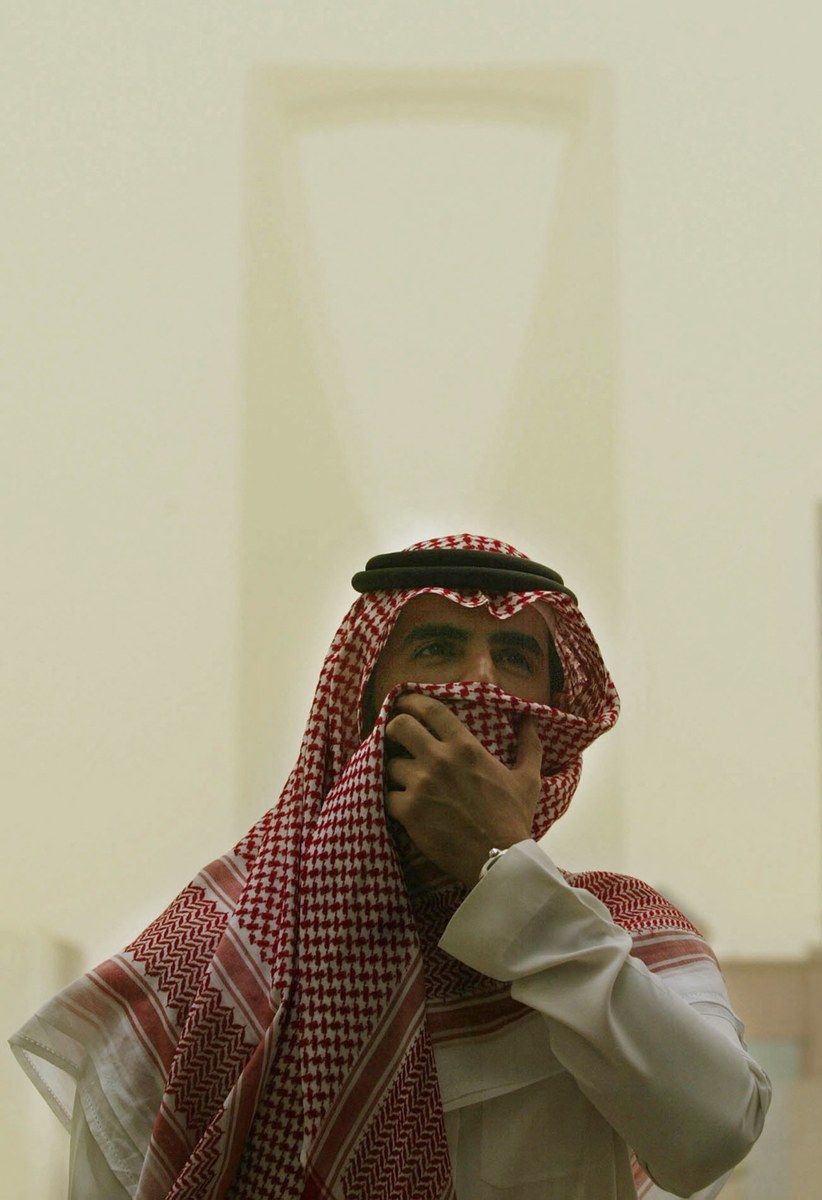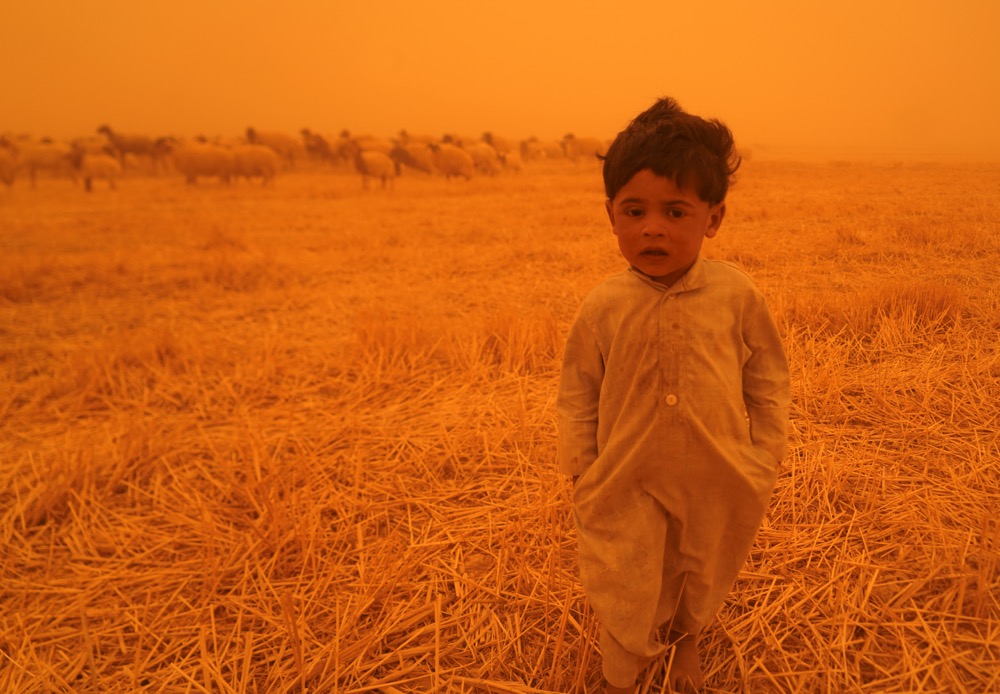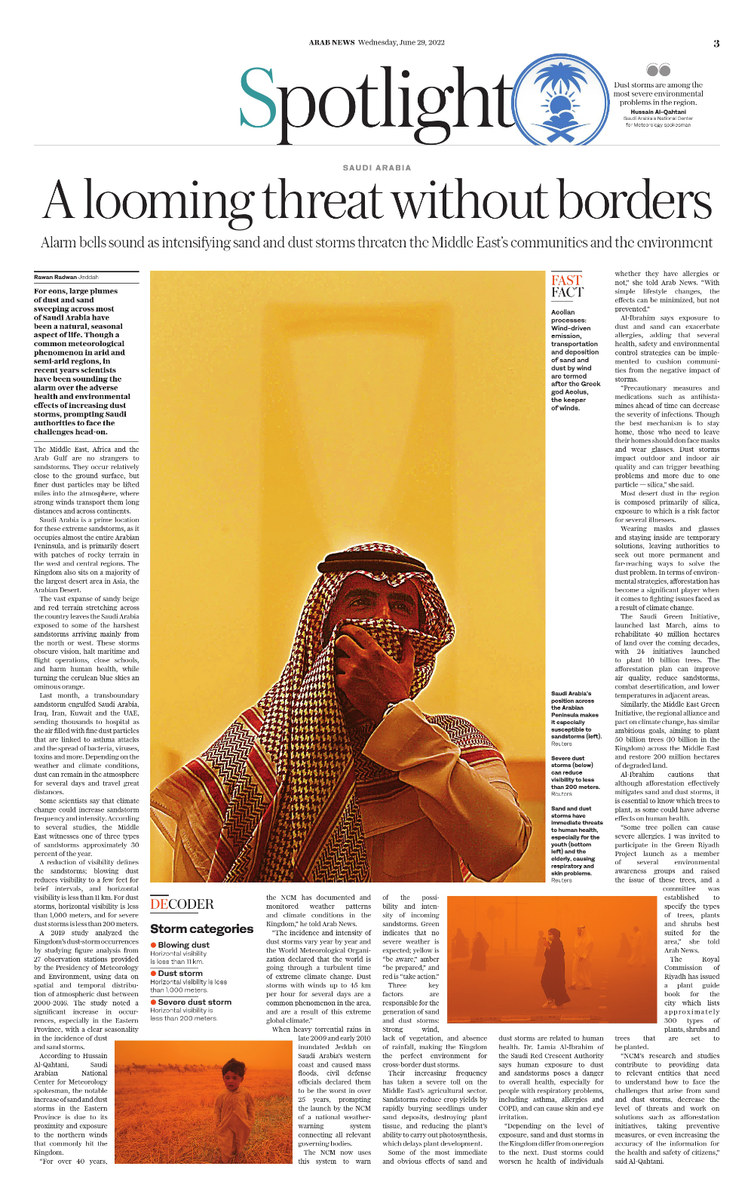JEDDAH: For eons, large plumes of dust and sand sweeping across most of Saudi Arabia have been a natural, seasonal aspect of life. Though a common meteorological phenomenon in arid and semi-arid regions, in recent years scientists have been sounding the alarm over the adverse health and environmental effects of increasing dust storms, prompting Saudi authorities to face the challenges head-on.
The Middle East, Africa and the Arab Gulf are no strangers to sandstorms. They occur relatively close to the ground surface, but finer dust particles may be lifted miles into the atmosphere, where strong winds transport them long distances and across continents.
Saudi Arabia is a prime location for these extreme sandstorms, as it occupies almost the entire Arabian Peninsula, and is primarily desert with patches of rocky terrain in the west and central regions. The Kingdom also sits on a majority of the largest desert area in Asia, the Arabian Desert.
The vast expanse of sandy beige and red terrain stretching across the country leaves Saudi Arabia exposed to some of the harshest sandstorms arriving mainly from the north or west. These storms obscure vision, halt maritime and flight operations, close schools, and harm human health, while turning the cerulean blue skies an ominous orange.

Saudi Arabia’s position across the Arabian Peninsula makes it especially susceptible to sandstorms. (Reuters)
Last month, a transboundary sandstorm engulfed Saudi Arabia, Iraq, Iran, Kuwait and the UAE, sending thousands to hospital as the air filled with fine dust particles that are linked to asthma attacks and the spread of bacteria, viruses, toxins and more. Depending on the weather and climate conditions, dust can remain in the atmosphere for several days and travel great distances.
Some scientists say that climate change could increase sandstorm frequency and intensity. According to several studies, the Middle East witnesses one of three types of sandstorms approximately 30 percent of the year.
A reduction of visibility defines the sandstorms; blowing dust reduces visibility to a few feet for brief intervals, and horizontal visibility is less than 11 km. For dust storms, horizontal visibility is less than 1,000 meters, and for severe dust storms is less than 200 meters.
A 2019 study analyzed the Kingdom’s dust-storm occurrences by studying figure analysis from 27 observation stations provided by the Presidency of Meteorology and Environment, using data on spatial and temporal distribution of atmospheric dust between 2000-2016. The study noted a significant increase in occurrences, especially in the Eastern Province, with a clear seasonality in the incidence of dust and sand storms.
STORM CATEGORIES
• Blowing dust: Horizontal visibility is less than 11 km.
• Dust storm: Horizontal visibility is less than 1,000 meters.
• Severe dust storm: Horizontal visibility is less than 200 meters.
According to Hussain Al-Qahtani, Saudi Arabian National Center for Meteorology spokesman, the notable increase of sand and dust storms in the Eastern Province is due to its proximity and exposure to the northern winds that commonly hit the Kingdom.
“For over 40 years, the NCM has documented and monitored weather patterns and climate conditions in the Kingdom,” he told Arab News.
“The incidence and intensity of dust storms vary year by year and the World Meteorological Organization declared that the world is going through a turbulent time of extreme climate change. Dust storms with winds up to 45 km per hour for several days are a common phenomenon in the area, and are a result of this extreme global climate.”
When heavy torrential rains in late 2009 and early 2010 inundated Jeddah on Saudi Arabia’s western coast and caused mass floods, civil defense officials declared them to be the worst in over 25 years, prompting the launch by the NCM of a national weather-warning system connecting all relevant governing bodies.
The NCM now uses this system to warn of the possibility and intensity of incoming sandstorms. Green indicates that no severe weather is expected; yellow is “be aware,” amber “be prepared,” and red is “take action.”
Three key factors are responsible for the generation of sand and dust storms: Strong wind, lack of vegetation, and absence of rainfall, making the Kingdom the perfect environment for cross-border dust storms.
Their increasing frequency has taken its toll on the Middle East’s agricultural sector. Sandstorms reduce crop yields by burying seedlings under sand deposits, destroying plant tissue, and reducing the plant’s ability to carry out photosynthesis, which delays plant development.

Sand and dust storms have immediate threats to human health, especially for the young and the elderly, causing respiratory and skin problems. (Reuters)
Some of the most immediate and obvious effects of sand and dust storms are related to human health. Dr. Lamia Al-Ibrahim of the Saudi Red Crescent Authority says human exposure to dust and sandstorms poses a danger to overall health, especially for people with respiratory problems, including asthma, allergies and COPD, and can cause skin and eye irritation.
“Depending on the level of exposure, sand and dust storms in the Kingdom differ from one region to the next. Dust storms could worsen he health of individuals whether they have allergies or not,” she told Arab News. “With simple lifestyle changes, the effects can be minimized, but not prevented.”
Al-Ibrahim says exposure to dust and sand can exacerbate allergies, adding that several health, safety and environmental control strategies can be implemented to cushion communities from the negative impact of storms.
“Precautionary measures and medications such as antihistamines ahead of time can decrease the severity of infections. Though the best mechanism is to stay home, those who need to leave their homes should don face masks and wear glasses. Dust storms impact outdoor and indoor air quality and can trigger breathing problems and more due to one particle — silica,” she said.
FASTFACT
• Aeolian processes: Wind-driven emission, transportation and deposition of sand and dust by wind are termed after the Greek god Aeolus, the keeper of winds.
Most desert dust in the region is composed primarily of silica, exposure to which is a risk factor for several illnesses.
Wearing masks and glasses and staying inside are temporary solutions, leaving authorities to seek out more permanent and far-reaching ways to solve the dust problem. In terms of environmental strategies, afforestation has become a significant player when it comes to fighting issues faced as a result of climate change.
The Saudi Green Initiative, launched last March, aims to rehabilitate 40 million hectares of land over the coming decades, with 24 initiatives launched to plant 10 billion trees. The afforestation plan can improve air quality, reduce sandstorms, combat desertification, and lower temperatures in adjacent areas.
Similarly, the Middle East Green Initiative, the regional alliance and pact on climate change, has similar ambitious goals, aiming to plant 50 billion trees (10 billion in the Kingdom) across the Middle East and restore 200 million hectares of degraded land.

Sandstorms across the Middle East have delayed flights, closed schools and hospitalised thousands. (AFP)
Al-Ibrahim cautions that although afforestation effectively mitigates sand and dust storms, it is essential to know which trees to plant, as some could have adverse effects on human health.
“Some tree pollen can cause severe allergies. I was invited to participate in the Green Riyadh Project launch as a member of several environmental awareness groups and raised the issue of these trees, and a committee was established to specify the types of trees, plants and shrubs best suited for the area,” she told Arab News.
The Royal Commission of Riyadh has issued a plant guide book for the city which lists approximately 300 types of plants, shrubs and trees that are set to be planted.
“NCM’s research and studies contribute to providing data to relevant entities that need to understand how to face the challenges that arise from sand and dust storms, decrease the level of threats and work on solutions such as afforestation initiatives, taking preventive measures, or even increasing the accuracy of the information for the health and safety of citizens,” said Al-Qahtani.















